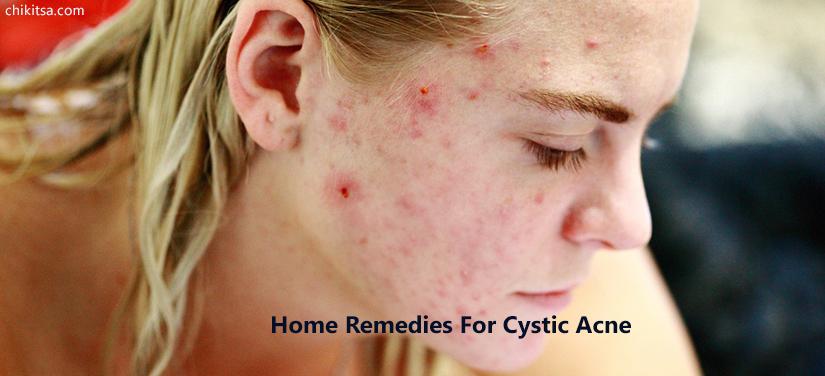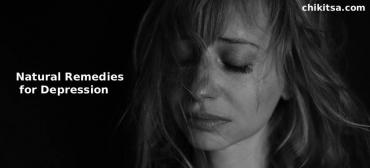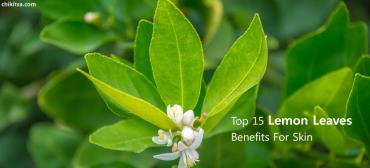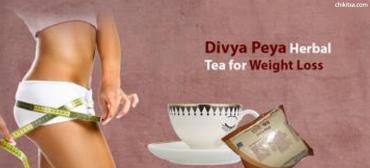Top 12 Home Remedies For Cystic Acne

According to the Centers for Disease Control and Prevention (CDC), acne is the most common skin condition for which people seek treatment. Likewise, it is well known that acne is indeed the commonest dermatological condition affecting millions of people worldwide. Acne frequently affects people in the age group of 15-25 years, being more common in women than in men. However, acne may occur in the pediatric age group and may also affect both men and women beyond 25 years of age. If your acne is not that serious or too much then by following some home remedies for cystic acne you can get rid of the condition. The following article will help you to know the home remedies for cystic acne.
What Is Cystic Acne?
Acne vulgaris or simply acne occurs as a result of infection of sebaceous glands or hair follicles present in the dermal layer (second or middle layer) of skin. Infection occurs when pores of the skin get clogged with excess sebum and dirt along with bacteria.
Grading for acne has been identified which allows patients as well as doctors to assess the severity of acne and treat it accordingly. Acne can be graded as;
| Grade 1 | Comedones (white and blackheads), occasional papules |
| Grade 2 | Papules, comedones, few pustules (tiny pus-filled acne) |
| Grade 3 | Predominant pustules, nodules, abscesses |
| Grade 4 | Cysts, abscess, scarring acne |
Acne of grades 3 and 4 are painful and red breakouts and occur deep into the skin; cystic acne belongs to these categories. Unlike acne vulgaris, cystic acne is more severe and tends to affect both men and women, being more common in women.
Signs And Symptoms Of Cystic Acne
- Cystic acne causes large, swollen red painful bumps on the skin.
- Cystic acne eruptions are pus-filled and are extremely sensitive to touch.
- Patients may experience itching around the cystic acne.
- They can last on the skin for several months or even years resulting in permanent scarring.
- Cystic acne can occur in areas of the body like face, back, chest and shoulders.
Causes Of Cystic Acne
Cystic acne can occur due to the following potential reasons;
- Hormonal cystic acne is seen frequently in women especially during:
- Pregnancy
- Before or during menses
- At menopause
- Among women using oral contraceptive pills
- In a condition called polycystic ovarian syndrome.
- Use of oily or greasy cosmetics, lotions or other skin care products which may clog pores
- Humid climate
- Medications like antitubercular medicines, corticosteroids, and anti-epileptic drugs may either trigger or worsen cystic acne.
12 Home Remedies For Cystic Acne
Cystic acne is relatively stubborn and may take plenty of time to heal, often leaving behind pits or scars on the skin. The following are some home remedies for cystic acne where you can follow to get magical results overnight; however, they will help you manage cystic acne at home and prevent scar formation when they heal. But if your acne is too much then it is always advised to see a most experienced medical practitioner/. Following are some home remedies for cystic acne where you can follow;
1. Ice
Rub a piece of ice on the swollen portion of cystic acne in a circular motion. Doing so not only helps to improve the blood circulation but also works well to reduce redness, swelling, and tenderness by cooling off the skin. This home remedy can be used at least 2-3 times a day.
2. Vinegar Cleanser
Vinegar has strong bactericidal properties.
How To Use
Mix about 2-3 cap full of white vinegar in a bowl of clean water. This solution can be used 2-3 times a day to cleanse the skin overlying the cystic acne.
3. Spot Treatment
Spot treatment or spot correction creams are available over the counter in a wide variety of brands. These spot treatment creams contain three major bactericidal contents – benzoyl peroxide, hydrocortisone, and salicylic acid. These three magical contents dry out acne and remove excess oil from the skin which means they even prevent the possibility of more acne.
4. Tea Tree Oil
This essential oil has made its place in several women’s cosmetics and skincare products like cleansers, toners, and facial oils since it has anti-inflammatory and anti-microbial properties. Tea tree oil ensures the unclogging of pores and removal of dirt and harmful bacteria from the skin which can cause acne. It can, therefore, be used to also prevent acne.
5. Turmeric
This age-old kitchen herb is well known for its anti-infective and antiseptic properties. Turmeric can be used locally as a pack or even consumed along with warm milk.
How To Use
Make a thick paste by mixing turmeric with some water. Apply this paste on the cystic acne and wash it after 30-45 minutes. Turmeric dries up the acne allowing the pus to drain.
6. Consider Probiotics
Probiotics help to maintain the gut bacteria in a healthy state. Once the gut bacteria are healthy, it can keep away inflammation and provide better overall health. Foods like green vegetables and yogurt are good sources of probiotics. Also, the regular consumption of these foods also prevents the occurrence of cystic acne.
7. Dietary Modifications
Certain foods like oily, greasy foods or dairy products can worsen acne. Similarly, sugary foods too can worsen acne since sugars are a good breeding ground for bacteria.
8. Go Stress-Free
There are several studies which can prove how stress can negatively affect people and cause illness not just physically, but also mentally and emotionally. Likewise, stress is one of the causes of acne breakouts. Given the constant stress that we are in, it is important to try ways to relax like meditation, yoga, spending time with pets, listening to music or even cooking.
9. Aspirin Mask
Aspirin is known to reduce inflammation and tenderness. Prepare an aspirin mask by crushing an aspirin tablet and mixing it with water to form a paste.
How To Use
Apply it directly onto the cystic acne and wash it off after 15-20 minutes.
10. Green Tea
Flavonoids and tannins present in green tea are anti-bacterial and anti-inflammatory in nature.
How To USe
Allow a few green tea leaves to boil in water. Strain into a bowl and let it cool. Use a cotton ball to apply the green tea directly to cystic acne.
11. Apple Cider Vinegar
Being acidic in nature and enriched with natural antioxidants, vitamins, and minerals, apple cider vinegar has marvelous anti-inflammatory properties. It helps to reduce inflammation and avoid pus formation within the acne.
How To Use
A solution can be made using apple cider vinegar with turmeric, baking soda, lemon juice or honey and applied directly over the cystic acne.
12. Skin Care
Some simple skin care tips can be followed to reduce inflammation of the acne or even prevent cystic acne, such as;
- Avoid washing face too many times – This can take away the natural oils and make the skin too dry
- Avoid picking at tiny pimples – Doing so can cause the infection to spread deeper and form cystic acne
- Use skincare products that are “non-comedogenicâ€. A lot of skincare products are non-comedogenic, that is they do not clog pores forming whiteheads or blackheads
- Avoid using products on the skin that are too harsh, such as excessive scrubbing or soaps and cleansers containing too many chemicals
Conclusion
Picking at cystic acne or attempting to drain them without proper medical assistance and using unsterile instruments can cause the infection to spread deeper or even infect the surrounding healthy skin.
Generally, it is a wise option to see a dermatologist for cystic acne if it does not respond to any of the above-mentioned home remedies or if it worsens despite the best home remedy for cystic acne solely because a poorly managed cystic acne can persist for a long duration and leave behind an ugly scar after healing.









